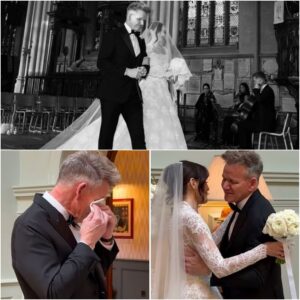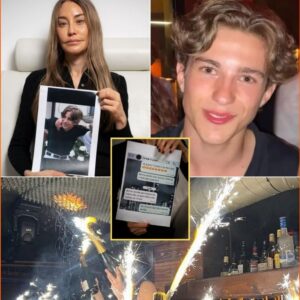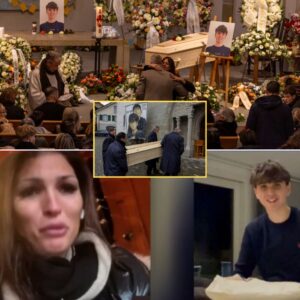The Price of Vengeance: A Blackwood Story
Julian Blackwood stood at the floor-to-ceiling windows of his penthouse office, surveying the glittering cityscape below. At thirty-two, he had built an empire most men only dreamed of, yet success tasted like ash. Every dollar earned, every company acquired, every rival crushed had been mere steps toward one singular goal: revenge. The memory of his father’s funeral fifteen years past still burned in his mind. Thomas Blackwood had been a brilliant architect, betrayed by his partner, Richard Rivers, who stole his designs, claimed them as his own, and drove Thomas to the heart attack that killed him. Julian had sworn then to make Rivers pay.
He had learned the art of corporate warfare, and now, Rivers’s architecture firm was drowning in debt. Julian held the strings. But financial ruin was not enough. He wanted Rivers to suffer as his father had, to lose what he loved most.
A knock at the door interrupted his grim contemplation. “Mr. Rivers is here, sir,” his assistant, Leonard, reported. “He looks desperate.” Julian’s smile was cold and sharp. “Make him wait twenty minutes, then send him in.”
When Richard Rivers finally entered the office, Julian barely recognized the man who had once seemed so powerful. Rivers’s expensive suit hung on a thin frame, and his hands trembled. “Blackwood, I’m here to ask for help,” Rivers pleaded. “The banks are calling in my loans. I’m losing everything.”
Julian leaned back. “You call destroying my father’s life work ‘differences’? Rivers paled. “That was business, nothing personal. If I could take it back…” Julian’s voice was ice. “But you cannot. However, I am not without mercy. I am willing to restructure your debts and save your company. For a price.” Hope flickered in Rivers’s eyes. “Name it. Anything.” Julian delivered the blow: “I want your daughter. I want Natalie to marry me.”
The color drained from Rivers’s face. “My daughter? She just graduated, she has her whole life ahead of her.” “And she can have it, as Mrs. Julian Blackwood, living in luxury,” Julian countered, his eyes merciless. “Or she can watch her father go to prison for the fraud I have uncovered in your accounts, and spend her life trying to care for her sick mother without money for treatment. Your wife’s cancer treatments are expensive, are they not? I wonder how long she would survive without them.” Rivers collapsed into the chair, the choice already made. Natalie Rivers would become Natalie Blackwood in two weeks.
Natalie sat in her favorite library corner when her father called her home. At twenty-three, she possessed a grace and intelligence that Julian’s research had only hinted at. Her world tilted when her father explained the debt, the threats, and Julian Blackwood’s monstrous proposition. “He is doing this to hurt me,” her father wept, “This is about revenge for something that happened long ago. But if you do not agree, we will lose everything—your mother’s treatments, our home, my freedom.”
She had heard of Julian Blackwood, the mysterious billionaire known for his ruthlessness. The thought of marrying such a man, of becoming a pawn, filled her with dread. But looking at her father’s anguish and thinking of her mother, she knew her answer. “I will do it,” she whispered. “I will marry him.”
Their first meeting three days later was charged with an unexpected tension. When Natalie opened the door, their eyes met. She saw a man more handsome than his rare photographs suggested, with jet-black hair and features carved from stone. He saw a woman whose beauty was softer and more genuine, with an intelligence in her gaze that made him pause. A flicker of something that might have been regret crossed his mind before the memory of his father hardened his jaw.
“I trust your father has explained our arrangement,” Julian stated, his voice deep and controlled.
“He told me you are using me to hurt him,” Natalie replied, lifting her chin despite the fear. “That this marriage is nothing more than an act of revenge.”
A slight smile touched Julian’s lips, devoid of warmth. “At least we understand each other. That will make things simpler. The wedding will be in ten days. Small, private, efficient. You will move into my home immediately afterward. Sign this.”
The prenuptial agreement was a contract for ownership, not partnership. It mandated separate living quarters and allowed dissolution at his discretion. “Do I have any choice in this?” she asked quietly. “You have the same choice your father had,” Julian replied, his eyes merciless. “Accept my terms or face the consequences. I suggest you accept.”
The wedding ceremony was sterile, a formality. Julian’s kiss was brief and cold. That evening, Natalie entered Blackwood Manor. It was a masterpiece of modern architecture—glass walls and expensive minimalism—beautiful but utterly lifeless. Mrs. Opel, the stern housekeeper, showed Natalie to her luxurious suite in the East Wing. “Mr. Blackwood’s private quarters are in the West Wing. He prefers not to be disturbed.” Natalie was in a golden cage.
The first month passed in silence. Julian buried himself in work; Natalie wandered the halls like a ghost. Mrs. Opel, kinder than her exterior suggested, confided one rainy afternoon: “Mr. Blackwood was not always so cold. Before his father died, he was a different person, bright, full of dreams.”
Natalie sought refuge in the manor’s library and, eventually, in the music room. One evening, as she played a haunting melody by Chopin, she didn’t notice Julian standing in the doorway, drawn home early by the sound. He watched her fingers dance, seeing the beauty and sadness in her playing, and felt something crack in the armor he had built around his heart.
When the music faded, he spoke. “I did not know you played.”
“My mother taught me,” she said softly.
“How is she?” Julian asked, surprising himself with genuine concern.
“Better. Thanks to the treatments you are paying for.” Natalie met his eyes. “I may hate this situation, but I am grateful for that.” The tension shifted. For the first time, they acknowledged a shared humanity. “Play something else,” he requested, his voice gentler than she had ever heard it. As she played, he stood beside the instrument. “The house feels less empty when there is music.” He left quickly, but the dynamic had changed. He had seen Natalie, the woman, not Rivers’s daughter, the pawn.
The following week, Julian announced they would attend the annual Riverside Charity Gala. “We need to be seen as a married couple.”
The gown he provided was a stunning emerald silk. When Natalie descended the grand staircase, Julian caught his breath. “You look exceptional,” he said, his voice rougher than intended.
At the gala, they played their roles perfectly. But midway through the evening, Natalie was spotted by Owen Parker, a childhood friend. Her face lit up with a genuine happiness Julian had never witnessed. Julian watched their easy embrace with narrowed eyes. A dark, primal jealousy surged through him. He noted how easily she smiled, how her whole demeanor brightened for this man.
When Owen asked for a dance, Natalie, tired of being controlled, accepted, meeting Julian’s dark gaze with defiance. As they waltzed, Julian stood rigid, his hands clenched. He watched Owen’s hand on his wife’s waist, and the possessive, visceral feeling that crashed through him was unlike the cold anger of his revenge. When had she become his in more than just legal terms? The realization stunned him.
When the dance ended, Julian gripped Natalie’s elbow. “We are leaving now.”
“Julian, the event is not over!” she protested.
His voice left no room for argument. He practically dragged her out. In the manor, her own anger erupted. “How dare you treat me like that? Owen is my friend, and you had no right!”
Julian whirled to face her, his control snapping. “I have every right! You are my wife!”
“Only on paper! This marriage is a farce, remember? You said so yourself!”
“Things change.” He advanced, caging her against the entrance hall wall. “You are mine, Natalie. The ring on your finger means something, whether you like it or not.”
“Since when?” she challenged, her chest heaving. “Since when do I mean anything to you beyond a tool for revenge?”
Julian’s hands braced beside her head. His face was inches from hers. “Since I cannot stop thinking about you. Since every man who looks at you makes me want to commit violence. Since I lie awake knowing you are just down the hall, and it is driving me insane.”
“You said you would never touch me,” she whispered. “That I was repulsive to you because I was Rivers’s daughter.”
“I lied,” his voice was a rough whisper. “God help me, I lied.” His mouth crashed down on hers. This was fire and fury, need and possession. All the tension, all the loneliness poured into the kiss. When they finally broke apart, Julian swept her into his arms and carried her not to her room, but to his. That night, Julian broke every promise he had made. The nature of their marriage had irrevocably changed.
The weeks that followed were a whirlwind of passion and confusion. Julian no longer avoided her, but he never spoke of feelings, never mentioned love. Natalie found herself falling for the man she glimpsed in quiet moments—the tenderness in his touch, the way he listened. But the shadow of revenge still hung over them. Julian had not abandoned his plan.
The crisis arrived on a cold November morning. Julian’s lead investigator delivered a file. Julian emerged from his study, his face ashen, filled with a primal rage. Richard Rivers had not only stolen designs but had systematically embezzled money and then framed Julian’s father as the thief. Julian’s father had died disgraced.
For three days, Julian shut her out. Finally, Natalie confronted him in his study. “What is wrong? Why are you shutting me out?”
“I received new evidence,” Julian said, his eyes haunted. “Your father is not just a betrayer. He is a criminal. He disgraced my father. Tomorrow, I’m going to destroy him. I’m releasing everything to the media and the authorities.”
“Julian, please,” Natalie pleaded. “My mother is so weak. The stress will kill her. Whatever he did, he is still my father. There has to be another way.”
“There is no other way,” Julian slammed his glass down. “This is why I married you. Have you forgotten? You were always just a pawn in this game, Natalie. Whatever has happened between us does not change that.”
The words succeeded in their intent. Natalie recoiled, removing her wedding ring and placing it on his desk. “I see. Then you have already made your choice. You choose revenge over everything else—over justice, over mercy, over love.”
“Love?” Julian laughed bitterly. “You think I could love the daughter of the man who destroyed my family?”
“I thought perhaps you could,” Natalie said steadily. “You are so consumed by hatred that you cannot see what it is costing you. You are becoming the very thing you hate, Julian. Your father would be ashamed.“
She left him standing there, packed a single bag, and walked out of Blackwood Manor in the middle of the night.
The next morning, Julian found the ring and the letter: “You can destroy my father if you must, but I will not stay to watch you destroy yourself. Somewhere in you is the man your father raised. The man I fell in love with. I hope someday you find him again. Goodbye, Julian.”
The press conference was scheduled for ten. Julian sat with the file, his phone, and Natalie’s letter. He could not stop hearing her voice: “Your father would be ashamed.” What would Thomas Blackwood think of his son using an innocent woman as a weapon? Julian allowed himself to consider forgiveness—not for Rivers’s sake, but for his own. He deserved to be free of the hatred that had poisoned his entire adult life.
He picked up the phone. He cancelled the press conference. He instructed his lawyer to quietly hand the evidence to the authorities, removing himself from the spectacle. He set up an anonymous trust fund to cover Mrs. Rivers’s treatments.
Then, Julian left his office and his company. He had a more important mission: he had to find his wife.
The search took three months. Julian finally tracked Natalie to a small coastal town. He found her closing an art gallery on a Saturday afternoon. When she saw him, she froze. As he crossed the street, he saw the small swell of her belly beneath her dress.
“You were pregnant,” he said, his voice thick with emotion.
“Yes, three months,” she confirmed, placing a protective hand on her stomach.
“Why did you not tell me?”
“I was protecting our child from a man consumed by hatred.”
“What are you doing here, Julian?” she asked tiredly.
“I came to tell you that you were right about everything,” Julian took a step closer. “I canceled the press conference. I turned the evidence over to the authorities discreetly. I am sorry for using you, for hurting you, for being too blind to see that revenge was destroying me.”
“What changed?”
“You did. Your words forced me to look at what I had become. I realized my father would not want me to live this way. You were brave enough to walk away from me, and that made me brave enough to walk away from revenge. I love you, Natalie. I have forgiven your father—not for his sake, but for mine and for our child’s. I want to build a life based on love, not hatred. Please, Natalie, come home.”
Natalie searched his face and saw something she had never seen before: peace.
“It will take time,” she said.
“Then I will wait,” Julian vowed, kneeling and gently resting his hand on her belly. “I will work every day to earn your trust back. You and our child are what matters. Please, Natalie, let me be the father our child deserves.”
Looking down at the powerful man humbled before her, Natalie felt her resistance crumble. “Yes,” she whispered. “Yes, we can try.”
Six months later, they remarried in a simple ceremony in the garden of Blackwood Manor. Their daughter, Emma, was born two months after that. When Julian held her for the first time, tears streamed down his face.
Julian Blackwood learned that the true way to honor his father’s memory was not through vengeance, but through building a life filled with love, family, and the courage to forgive. Their story became one of redemption and the power of love to heal even the deepest wounds. They had found something far more valuable than vengeance: peace.





